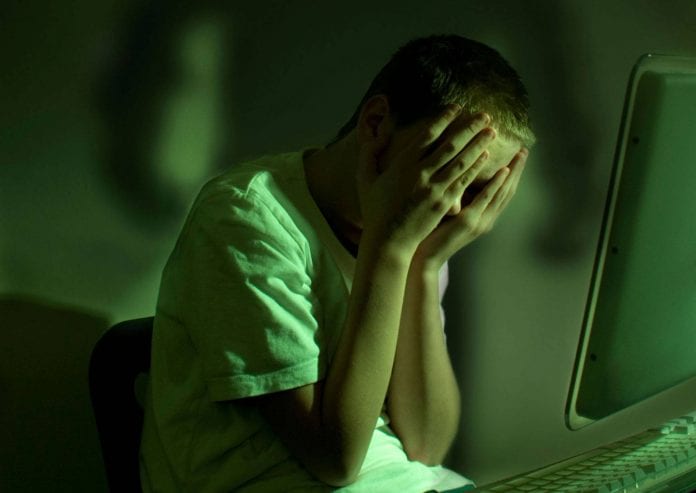Childline counselling for cyber-bullying continues to rise
- More than 200 Welsh children had counselling sessions for cyber-bullying over last two years
- Last year Childline counselled more children across the UK about cyber-bullying than ever before
More than 200 Welsh children had counselling sessions from Childline about cyber-bullying over the last two years, new figures reveal at the start of Anti-Bullying Week.
The NSPCC’s confidential support service saw a 49% increase in counselling sessions with children from Wales who are plagued by cyber-bullying, with children raising concerns with counsellors about name-calling, rumour spreading and blackmail posted publicly on social media profiles.
In the last year alone Childline held 121 counselling sessions with children from Wales about cyber-bullying, rising from 81 in 2015-16. The true figures are likely to be far higher as many children who contact Childline do not say where they are contacting from.
One boy told Childline:
“I’m being bullied on social media by people who call me fat and ugly. I can’t block them because then they’ll just bully me even more at school. I don’t want to talk to my teachers about it, I just feel like giving up. I’ve been self-harming to cope but I just want to stop feeling this way.”
Across the UK Childline delivered 5,103 counselling sessions about cyber-bullying in 2016/17 – a 12 per cent increase from the previous year.[1]
Since Childline, run by the NSPCC, specifically started recording cyber-bullying counselling sessions five years ago they have more than doubled.[2]
Children as young as nine told Childline counsellors they were being targeted by online bullies, with girls and 12-15 year-olds receiving the most counselling sessions about this issue.[3]
Name-calling, spreading rumours, death threats and blackmail posted publicly on social media profiles, blogs and online pictures were just some of the ways young people told counsellors they were being tormented.
Cyber-bullying is also contributing to young people’s mental health issues, such as low self-esteem, depression, self-harming and suicidal thoughts.
The 24/7 nature of social media and the feeling they are unable to escape the bullies, even at home, can leave young people struggling to cope.
Des Mannion, head of NSPCC Cymru/Wales, said:
“Young people these days rely upon their mobile phones and social media to keep in touch with their friends, but inevitably that makes it easier for bullies to pursue their victims relentlessly. Whether bullying occurs online or in person it can have a devastating impact on a young person, destroying their confidence and leaving them isolated and vulnerable.
“Every year as a nation we lose precious young lives because bullying has made children and teenagers feel that life is not worth living. Childline wants to remind young people that they are not alone. We are here for them day and night, offering confidential help and advice on effective ways to beat the bullies.”
The NSPCC is calling on the UK Government to draw up a rulebook enshrined in law to require all social media sites to protect children from cyber-bullying and other online abuse.
These rules should require social media companies to introduce cyber-bullying alerts which flags bullying behaviour to moderators and sends notifications to young people being targeted.
In addition there needs to be strict privacy settings by default, clear and easy to understand reporting processes, and specially-trained child safety moderators.
This year Anti-Bullying Week looks at the theme ‘All Different, All Equal’ to empower children and young people to celebrate what makes them, and others, unique.
Martha Evans, National Coordinator of the Anti-Bullying Alliance who runs Anti-Bullying Week, said:
“These worrying statistics from the NSPCC shows what an important issue cyber-bullying is for young people today. The social pressures that children face are immense and this is compounded by messaging online. We know bullying often starts face to face and spreads into the digital world.
“Anti-Bullying Week is sending the message we are ‘All Different, All Equal’ and we hope to provide a platform for children, teachers and parents, to raise awareness of what to do if a child is being bullied, or they see it happening to someone else.
“We should all be doing more, including social media companies, Government, schools, parents and anti-bullying charities, to spread the message online as well.”
The NSPCC have published advice for parents if they think their child is being bullied online:
- Make sure they know they can come to you for help
- Help them relax and take time out, away from electronic devices
- Teach them how to stay safe online and to block abusive or humiliating content
- Talk to your child’s school or club about what’s been happening
- Report online videos of bullying
- Explain to them that our differences are important and they make you who you are
Over the last year children have viewed the cyber-bullying pages on the Childline website more than 73,000 times, with some posting about their experiences of cyber-bullying as well as sharing support to their peers through message boards.
The NSPCC are also working with the Royal Foundation Taskforce on the Prevention of Cyberbullying, in order to develop new tools and solutions for children and young people to support their friends who are being bullied online.
Children and young people can contact Childline for free, confidential support and advice, 24 hours a day on 0800 1111 or at www.childline.org.uk Parents can contact O2/NSPCC for free advice on keeping their children safe online on 0808 800 5002.
David’s Story
David (22), from Holywell in North Wales, is a confident young man who is currently studying electrical engineering at college. However, between the age of 11 and 12 his confidence was knocked as he was bullied by students at his high school which left him feeling isolated and alone.
The bullying began when David started high school. Students from the same junior school, whom David considered to be friends, seemed to turn against him almost overnight and started to bully him. He was called names, his school books were misplaced and he even had his bag stolen on the way home from school. David said; “They started bullying me to make themselves seem cool to the other new kids. They liked to pick on the kids who they knew wouldn’t fight back.”
David’s school work started to suffer because he wasn’t able to concentrate while at school. David said; “I was constantly worried that something was going to happen, especially on the way home from school.”
One incident stands out for David in particular and it was this that led him to call ChildLine. He explains; “It was during PE class, I was pinned up against a wall and hit a few times. I had red marks around my neck afterwards as someone had held me against the wall by my neck.” This incident upset David so much that he tried to speak to his head of year about what had been going on but they were not supportive, even suggesting that David ‘didn’t help himself’.
However, David did get support from his mum who had noticed the marks around his neck and she suggested that he speak to the school counsellor. They recommended David talk to Childline.
The first time David called Childline he was able to speak to a counsellor within three minutes. David said; “It wasn’t easy opening up at first but the Childline counsellor was really good at encouraging me, telling me that I was doing really well and brave for speaking out. It helped a lot to hear that.”
David spoke to Childline twice and both times they listened to him and gave him tools to overcome the bullying. The counsellor suggested that he speak to his head of year again and to explain clearly what was happening. They also suggested that he steer away from this specific group of people. David said; “The advice was good, it all worked out.”
As a result of speaking to Childline, David started to feel better. He gained the confidence to make new friends and didn’t have any contact with the bullies again. He said: “It felt like a huge weight had been lifted off my shoulders and most importantly I was able to concentrate on my school work again.”
Having seen how Childline helped her son, David’s mum, became a counsellor.
Help keep news FREE for our readers
Supporting your local community newspaper/online news outlet is crucial now more than ever. If you believe in independent journalism, then consider making a valuable contribution by making a one-time or monthly donation. We operate in rural areas where providing unbiased news can be challenging. Read More About Supporting The West Wales Chronicle























